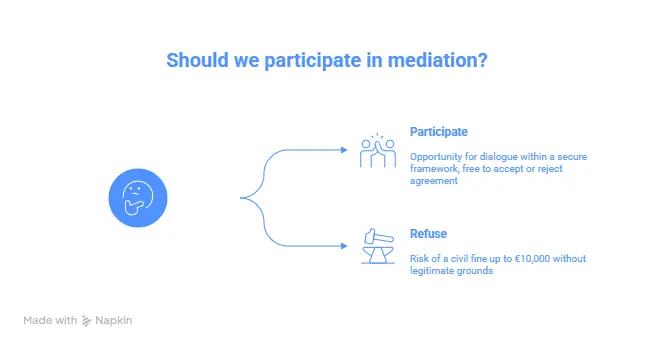Sommaire
Introduction
Decree No. 2025-660 of 18 July 2025 marks a decisive step in the evolution of civil litigation in France. It places amicable settlement between the parties at the very heart of the procedure, relegating the role of the judge to one of support and guarantee.
The objective is clear: to reduce the burden and slowness of proceedings, to grant litigants greater freedom, and to encourage cooperation rather than confrontation. The parties may now, with the assistance of their lawyers, determine the organisation and pace of their dispute themselves.
In practice, two avenues are now available: a flexible conventional case management for simpler matters, and a more structured participatory procedure for complex disputes. In all instances, the judge intervenes as a secondary arbiter, ensuring fairness and the security of the process.
Another major innovation is that the judge may now require the parties to meet with a mediator. Refusal without legitimate grounds exposes the party to a financial penalty of up to €10,000. This measure reflects a strong political will to embed a genuine “amicable culture” within the French judicial landscape.
For businesses, the reform translates into disputes being resolved more quickly, at lower cost, and with greater predictability. For lawyers, it offers the opportunity not only to defend, but also to build tailor-made solutions.
Conventional case management: a new guiding principle
A reversed logic: settlement before the judge
Until now, the management of a civil case was dictated by a timetable imposed by the judge. The decree reverses this logic: it is now for the parties, assisted by their lawyers, to determine the modalities of case management. The judge intervenes only in the event of a deadlock or failure.
This shift is far from trivial. It reflects a political desire to reduce court congestion while making justice more efficient. It also enhances the responsibility of the parties, who become active participants in their dispute rather than passive spectators of an imposed procedure.
Take the example of a trademark infringement dispute. Instead of waiting for hearings scheduled months apart, the parties may agree on a timetable tailored to their economic constraints, subject to simplified validation by the judge. This reduces delays and prevents purely dilatory strategies.
Two procedures adapted to the complexity of the dispute
The decree distinguishes between:
- Conventional case management of general application, more flexible and suitable for simple or technical disputes;
- The participatory procedure for case management, more formalised and designed for complex matters where a clear framework is indispensable.
This dual approach provides genuine flexibility and allows litigants’ diverse needs to be met, whether the dispute concerns a straightforward contractual claim or a major economic conflict.
Strengthened ADR mechanisms: the “multi-door” justice system
The guiding role entrusted to the judge
The decree redefines the judge’s mission: no longer merely an arbiter who renders a decision, the judge now assumes the role of procedural guide, steering the parties towards the dispute resolution method best suited to their case. This approach is inspired by “multi-door justice” models already developed in other countries, where the judge offers several settlement options: judicial proceedings, mediation, conciliation, or participatory procedure.
This logic personalises the judicial response. A dispute between shareholders, a consumer conflict, or an intellectual property infringement do not necessarily call for the same solution. The judge thus becomes a pivotal actor, ensuring the most appropriate orientation.
The mediation order and its sanctions
One striking innovation is that the judge may now order the parties to meet with a mediator. This does not mean forcing them to reach an agreement, but requiring them at least to explore the possibility.
- If the parties participate: they remain free to accept or reject an agreement, but they will have had the opportunity to engage in dialogue within a secure framework.
- If they refuse without legitimate grounds: they risk a civil fine of up to €10,000.
This sanction, unprecedented in French procedure, clearly demonstrates the determination to entrench amicable settlement in legal practice.
In this context, Dreyfus & Associés positions itself as a trusted partner, capable of intervening in the amicable procedures encouraged by the decree.
As judicial experts, we are regularly appointed by courts and parties to assist and secure amicable procedures, making us a preferred partner for efficiently resolving disputes.
Recodification for greater clarity and legal certainty
A unified and accessible body of rules
Prior to this reform, provisions on ADR were scattered across various chapters of the French Code of Civil Procedure, sometimes difficult for practitioners to locate. The decree now consolidates these rules into a single title, creating a coherent and accessible framework.
This codification effort improves access to the law and strengthens legal certainty. Lawyers, judges, and businesses now enjoy better visibility to anticipate their procedural strategies.
Practical implications for businesses and lawyers
For businesses, the reform offers tangible benefits:
- greater control over timelines,
- reduced procedural costs,
- enhanced opportunities to preserve commercial relationships through balanced agreements.
In the field of intellectual property, for instance, a company may resolve a dispute over the use of a domain name through supervised mediation rather than lengthy court proceedings.
For lawyers and experts, the role is profoundly reshaped: it now involves not only defending rights, but also designing and securing amicable solutions.
Conclusion: towards a lasting culture of amicable settlement
The Decree of 18 July 2025 heralds a profound cultural shift in French law. Amicable settlement is becoming the primary pathway, with litigation the last resort. This evolution promotes faster, more flexible, and often more suitable resolutions for the parties’ interests.
Dreyfus & Associés stands by businesses and stakeholders to implement these new rules, bringing our expertise in amicable and judicial dispute resolution to ensure the best outcome for your disputes.
Dreyfus & Associés operates in partnership with a global network of lawyers specialising in intellectual property.
Nathalie Dreyfus with the support of the entire Dreyfus team
FAQ
Does mediation become mandatory?
No, but the judge may order the parties to meet with a mediator, and may sanction unjustified refusal with a fine.
What are the advantages for businesses?
Shorter timelines, better-controlled costs, and solutions more in line with economic realities.
What are the sanctions for refusing amicable settlement?
A civil fine of up to €10,000, imposed by the judge.
How does this decree affect intellectual property?
Disputes concerning trademarks, patents, or domain names may now be resolved more efficiently through mediation or conciliation.
Why speak of a “multi-door justice system”?
Because the judge directs the parties towards several possible resolution mechanisms, depending on the nature of the dispute: conventional litigation, mediation, conciliation, or participatory procedure.


